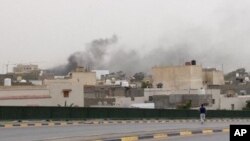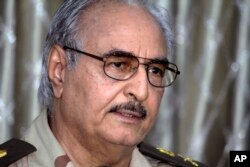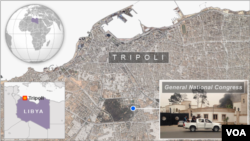Libya's army chief ordered the deployment of Islamist-led militias to the capital Tripoli on Monday in response to the storming of parliament by forces loyal to a renegade ex-general. The move paves the way for a possible showdown between rival militia fighters.
Meanwhile, the revolt against Islamists who dominate Libyan politics threatened to spiral into an outright battle for power after an elite army unit, the Special Forces, joined the uprising Monday.
The commander of the Special Forces has announced his support for retired General Khalifa Haftar and his National Libyan Army. His forces have been fighting militants for months in Benghazi, Libya's second largest city.
Forces apparently loyal to former Army Chief of Staff Khalifa Haftar said they suspended parliament Sunday after earlier leading a military assault against lawmakers, directly challenging the legitimacy of the country's weak central government three years after the overthrow of dictator Muammar Gadhafi.
Libya's interim government condemned the attack on parliament and largely ignored the declaration by the general's group.
For hours after the attack on Sunday, fighting took place around the road to Tripoli's airport and its southern outskirts between Haftar’s forces and Islamist militiamen.
By Monday morning, the gunfire died down and a tentative calm returned to the city. Each side claimed to have the support of the Libyan people, VOA's Edward Yeranian reported from Cairo, and demanded the other back down.
The revolt by Haftar threatens to detonate the long volatile divisions among the multiple militias that dominate Libya amid the weakness of the central government and military.
Haftar said he aims to crush Islamists he accuses of seizing control of the country and he appears to have the support of some militias from the eastern half of the country and the western Zintan region.
In the other camp, parliament chief Nouri Abu Sahmein - an Islamist-leaning politician - ordered a powerful umbrella group of mainly Islamist militias known as “Libya's Central Shield'' to mobilize on Monday to defend against Haftar's forces. The umbrella group is dominated by a militia from Libya's third largest city, Misrata.
Further raising the potential for chaos, one of Libya's many al-Qaida-inspired extremist groups on Monday vowed to fight Haftar's forces, AP reported.
Also on Monday, Libya's outgoing government demanded that parliament suspend its work until the next general election after an impending vote on the 2014 budget, and
re-run the controversial election of a new premier, a cabinet statement said, according to Reuters.
The cabinet of Prime Minister Abdullah al-Thinni submitted its proposal to parliament as a solution to Libya's political chaos and violence, the statement said.
Attack creates more chaos
The confrontations over the weekend further deepens the chaos Libya has endured since 2011. With militias running rampant, the central government has little power, and the army and police remain shattered since the civil war that ousted Gadhafi.
Parliament is divided between Islamist parties - which hold a majority - and their opponents, each of which are backed by rival militias.
The legal mandate for Libya's parliament ran out several months ago and caretaker Thani's government resigned several weeks ago.
Thani's successor, businessman Ahmed Maitiq, who is supported by Islamist parties including the Muslim Brotherhood, has been unable to form a government and opponents dispute his legitimacy, the VOA reported.
Haftar, a former rebel in the fight against Gadhafi, appears to be trying to harness widespread public frustration with the government's impotence, vowing to get rid of extremists and impose an effective authority.
On Sunday, militiamen loyal to him stormed the parliament building in Tripoli, ransacking the building. Two people were reportedly killed and more than 50 wounded.
Haftar sent his fighters into Benghazi last Friday against Islamist militants based there. Authorities said at least 70 people were killed, according to AP.
Video obtained by Reuters showed armed gunmen from Haftar's brigade engaged in the firefight in Benghazi. Gunshots could be heard and a car is seen burning.
Worried by the threat of more fighting, both the United Arab Emirates and Saudi Arabia closed their embassies in Tripoli on Monday. Turkey closed its consulate in Benghazi and evacuated its employees to a local airport. Algeria withdrew its ambassador last week.
Algeria also closed off land borders with Libya over security concerns on Monday, Reuters reported.
The European Union said Monday it is "deeply concerned" by developments in Libya after armed groups attacked parliament in Tripoli and an air base in the east.
A spokesman for Foreign Affairs Chief Catherine Ashton said the EU was concerned about the "continuing deterioration," the French news agency AFP reported.
"The EU renews its commitment to support the Libyan people ... and calls on all parties to build consensus so as to ensure a transition to a stable democracy," spokesman Michael Mann said.
EU member states, especially former colonial power Italy and its southern neighbors, are also worried by a sharp increase in the influx of refugees from Libya this year, in part due to the deteriorating security situation in the country.
Government struggles
Elsewhere Monday, a Libyan air force base in the eastern city of Tobruk announced that it had decided to join forces with Haftar, Reuters reported.
“The Torbuk air force base will join ... the army under the command of General Khalifa Qassim Haftar,'' said the statement posted on social media websites. Staff at the air base confirmed its authenticity, Reuters reported.
Libya also extended the closure of the airport in the main eastern city of Benghazi until May 25 because of the unrest, the airport director said. It was attacked overnight with Grad rockets.
Since the toppling of Gadhafi in 2011, successive Libyan governments have struggled to impose order as heavily armed former rebels have carved out their own fiefdoms.
Militia brigades in armored trucks mounted with anti-aircraft canons have often stormed parliament, occupied ministries and even kidnapped the prime minister last year in a show of military muscle to make political demands.
But Sunday's attack on parliament was the most serious violence in the capital for months, and appeared to expand Haftar's campaign against hardline Islamists, who emerged as a force in North Africa since the Arab Spring revolts of 2011.
VOA’s Edward Yeranian in Cairo contributed to this report. Some information was provided by AP, Reuters and AFP.
Meanwhile, the revolt against Islamists who dominate Libyan politics threatened to spiral into an outright battle for power after an elite army unit, the Special Forces, joined the uprising Monday.
The commander of the Special Forces has announced his support for retired General Khalifa Haftar and his National Libyan Army. His forces have been fighting militants for months in Benghazi, Libya's second largest city.
Forces apparently loyal to former Army Chief of Staff Khalifa Haftar said they suspended parliament Sunday after earlier leading a military assault against lawmakers, directly challenging the legitimacy of the country's weak central government three years after the overthrow of dictator Muammar Gadhafi.
Libya's interim government condemned the attack on parliament and largely ignored the declaration by the general's group.
For hours after the attack on Sunday, fighting took place around the road to Tripoli's airport and its southern outskirts between Haftar’s forces and Islamist militiamen.
By Monday morning, the gunfire died down and a tentative calm returned to the city. Each side claimed to have the support of the Libyan people, VOA's Edward Yeranian reported from Cairo, and demanded the other back down.
The revolt by Haftar threatens to detonate the long volatile divisions among the multiple militias that dominate Libya amid the weakness of the central government and military.
Haftar said he aims to crush Islamists he accuses of seizing control of the country and he appears to have the support of some militias from the eastern half of the country and the western Zintan region.
In the other camp, parliament chief Nouri Abu Sahmein - an Islamist-leaning politician - ordered a powerful umbrella group of mainly Islamist militias known as “Libya's Central Shield'' to mobilize on Monday to defend against Haftar's forces. The umbrella group is dominated by a militia from Libya's third largest city, Misrata.
Further raising the potential for chaos, one of Libya's many al-Qaida-inspired extremist groups on Monday vowed to fight Haftar's forces, AP reported.
Also on Monday, Libya's outgoing government demanded that parliament suspend its work until the next general election after an impending vote on the 2014 budget, and
re-run the controversial election of a new premier, a cabinet statement said, according to Reuters.
The cabinet of Prime Minister Abdullah al-Thinni submitted its proposal to parliament as a solution to Libya's political chaos and violence, the statement said.
Attack creates more chaos
The confrontations over the weekend further deepens the chaos Libya has endured since 2011. With militias running rampant, the central government has little power, and the army and police remain shattered since the civil war that ousted Gadhafi.
Parliament is divided between Islamist parties - which hold a majority - and their opponents, each of which are backed by rival militias.
The legal mandate for Libya's parliament ran out several months ago and caretaker Thani's government resigned several weeks ago.
Thani's successor, businessman Ahmed Maitiq, who is supported by Islamist parties including the Muslim Brotherhood, has been unable to form a government and opponents dispute his legitimacy, the VOA reported.
Haftar, a former rebel in the fight against Gadhafi, appears to be trying to harness widespread public frustration with the government's impotence, vowing to get rid of extremists and impose an effective authority.
On Sunday, militiamen loyal to him stormed the parliament building in Tripoli, ransacking the building. Two people were reportedly killed and more than 50 wounded.
Haftar sent his fighters into Benghazi last Friday against Islamist militants based there. Authorities said at least 70 people were killed, according to AP.
Video obtained by Reuters showed armed gunmen from Haftar's brigade engaged in the firefight in Benghazi. Gunshots could be heard and a car is seen burning.
Worried by the threat of more fighting, both the United Arab Emirates and Saudi Arabia closed their embassies in Tripoli on Monday. Turkey closed its consulate in Benghazi and evacuated its employees to a local airport. Algeria withdrew its ambassador last week.
Algeria also closed off land borders with Libya over security concerns on Monday, Reuters reported.
The European Union said Monday it is "deeply concerned" by developments in Libya after armed groups attacked parliament in Tripoli and an air base in the east.
A spokesman for Foreign Affairs Chief Catherine Ashton said the EU was concerned about the "continuing deterioration," the French news agency AFP reported.
"The EU renews its commitment to support the Libyan people ... and calls on all parties to build consensus so as to ensure a transition to a stable democracy," spokesman Michael Mann said.
EU member states, especially former colonial power Italy and its southern neighbors, are also worried by a sharp increase in the influx of refugees from Libya this year, in part due to the deteriorating security situation in the country.
Government struggles
Elsewhere Monday, a Libyan air force base in the eastern city of Tobruk announced that it had decided to join forces with Haftar, Reuters reported.
“The Torbuk air force base will join ... the army under the command of General Khalifa Qassim Haftar,'' said the statement posted on social media websites. Staff at the air base confirmed its authenticity, Reuters reported.
Libya also extended the closure of the airport in the main eastern city of Benghazi until May 25 because of the unrest, the airport director said. It was attacked overnight with Grad rockets.
Since the toppling of Gadhafi in 2011, successive Libyan governments have struggled to impose order as heavily armed former rebels have carved out their own fiefdoms.
Militia brigades in armored trucks mounted with anti-aircraft canons have often stormed parliament, occupied ministries and even kidnapped the prime minister last year in a show of military muscle to make political demands.
But Sunday's attack on parliament was the most serious violence in the capital for months, and appeared to expand Haftar's campaign against hardline Islamists, who emerged as a force in North Africa since the Arab Spring revolts of 2011.
VOA’s Edward Yeranian in Cairo contributed to this report. Some information was provided by AP, Reuters and AFP.






